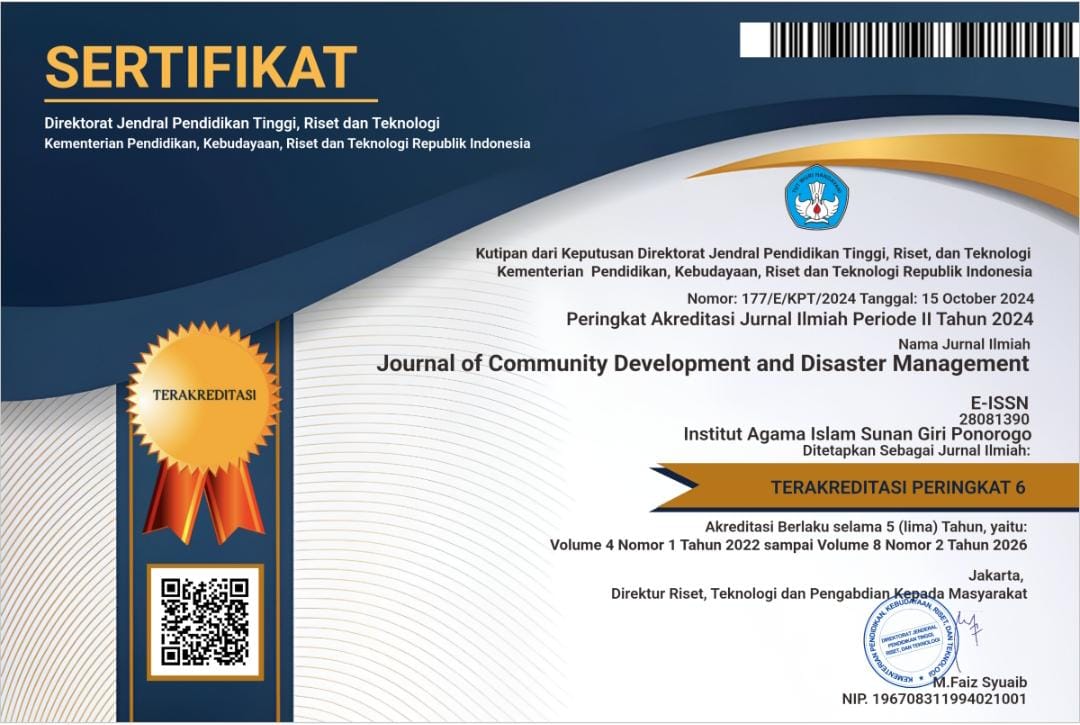Application “Pentol Bakar (Pencet Tombol Bila Ada Kegawatdaruratan Jiwa)” As an Innovation of RSJID Dr. Aminogondohutomo
Keywords:
Application, Emergencie, Medical Services, Mental healthAbstract
Based on WHO data in 2019, every 8 people or around 970 million people worldwide. The problem of mental disorders is a complex issue while in Indonesia access to services is limited so that to optimise health services innovation is needed, especially in digital technology. This study aims to determine how the analysis of the use of the pentol bakar application at RSJD Dr. Amino Gondohutomo along with SWOT analysis. (Strengths, weaknesses, opportunities, threats). The literature search method in this study is a scoping review using the PCC framework to create journal inclusion and exclusion criteria and PRISMA-ScR (Preferred Reporting Items for Systematic Reviews and Meta-Analyses Extension for Scoping Reviews). The results of this research review are 5 articles that match the research topic from 893 articles. The Pentol Bakar application made by RSJD Dr.Amino Gondohutomo has advantages in the form of easy access for patients and families and helps health services more efficiently because of a faster response. While the shortcomings in using the application are in the form of a lack of information and understanding related to the application used. SWOT analysis conducted by researchers can provide recommendations in the future in using the application so that it is more effective. These findings are expected to make a positive contribution in improving the quality of mental health services in related institutions.
References
Abas, R., & Sukihananto. (2023). IntervensiiKesehatan Mental Berbasis Teknologi Internet. Jurnal Kesehatan, 16(1), 1167–1173. https://doi.org/10.32763/xpv98j24
Arjadi, R., Nauta, M. H., & Bockting, C. L. H. (2018). Acceptability of internet-based interventions for depression in Indonesia. Internet Interventions, 13(June), 8–15. https://doi.org/10.1016/j.invent.2018.04.004
Ayuningtyas, D., Misnaniarti, M., & Rayhani, M. (2018). Analisis Situasi Kesehatan Mental Pada Masyarakat Di Indonesia Dan Strategi Penanggulangannya. Jurnal Ilmu Kesehatan Masyarakat, 9(1), 1–10. https://doi.org/10.26553/jikm.2018.9.1.1-10
Bond, R. R., Mulvenna, M. D., Potts, C., O’Neill, S., Ennis, E., & Torous, J. (2023). Digital transformation of mental health services. Npj Mental Health Research, 2(1), 1–9. https://doi.org/10.1038/s44184-023-00033-y
Cucu Rokayah, A. A. I. (2023). Jurnal Keperawatan. Jurnal Keperawatan Stikes Kendal, 15, 77–86.
Danielle Levac, H. C. & K. K. O. (2010). Scoping studies: advancing the methodology. Representing and Intervening, 1–18. https://doi.org/10.1017/cbo9780511814563.003
Ebidor, L.-L., & Ikhide, I. G. (2024). Literature Review in Scientific Research: An Overview. East African Journal of Education Studies, 7(2), 179–186. https://doi.org/10.37284/eajes.7.2.1909
Koh, J., Tng, G. Y. Q., & Hartanto, A. (2022). Potential and Pitfalls of Mobile Mental Health Apps in Traditional Treatment: An Umbrella Review. Journal of Personalized Medicine, 12(9). https://doi.org/10.3390/jpm12091376
Lockwood, C., & Tricco, A. C. (2020). Preparing scoping reviews for publication using methodological guides and reporting standards. Nursing and Health Sciences, 22(1), 1–4. https://doi.org/10.1111/nhs.12673
Lounsbury, O., Roberts, L., Kurek, N., Shaw, A., Flott, K., Ghafur, S., Labrique, A., Leatherman, S., Darzi, A., & Neves, A. L. (2022). The role of digital innovation in improving healthcare quality in extreme adversity: An interpretative phenomenological analysis study. Journal of Global Health Reports, 6, 1–13. https://doi.org/10.29392/001c.37241
Maritska, Z., Prananjaya, B. A., Nabila, S. P., & Parisa, N. (2023). Promosi Kesehatan Jiwa Berbasis Media Sosial (Instagram Live) Bagi Masyarakat di Masa Pandemi COVID-19. Wal’afiat Hospital Journal, 4(1), 13–22. https://doi.org/10.33096/whj.v4i1.98
Mavrogiorgou, P., Brüne, M., & Juckel, G. (2011). The management of psychiatric emergencies. Deutsches Arzteblatt, 108(13), 222–230. https://doi.org/10.3238/arztebl.2011.0222
Moore, H. E., Siriwardena, A. N., Gussy, M., & Spaight, R. (2023). Mental health emergencies attended by ambulances in the United Kingdom and the implications for health service delivery: A cross-sectional study. Journal of Health Services Research and Policy, 28(2), 138–146. https://doi.org/10.1177/13558196221119913
Moskovitz, J., Ba, J. S., & Do, M. G. (2020). Interfacility ambulance transport of mental health patients. November 2019, 173–182. https://doi.org/10.1002/emp2.12012
Naslund, J. A., Gonsalves, P. P., Gruebner, O., Pendse, S. R., Smith, S. L., Sharma, A., & Raviola, G. (2019). Digital Innovations for Global Mental Health: Opportunities for Data Science, Task Sharing, and Early Intervention John. Physiology & Behavior, 6(4), 337–351. https://doi.org/10.1007/s40501-019-00186-8
Peters, M., Godfrey, C., McInerney, P., Munn, Z., Tricco, A., & Khalil, H. (2017). 2017 Guidance for the Conduct of JBI Scoping Reviews Chapter 11 : Scoping Reviews Scoping Reviews. Understanding Scoping Reviews: Definition, Purpose, and Process, 18(10), 2119–2126.
Salsabilah, N., Shaluhiyah, Z., & Mustofa, S. B. (2023). Analisis faktor pemanfaatan pelayanan Rumah Sakit Jiwa: Systematic literature review. Holistik Jurnal Kesehatan, 17(2), 114–124. https://doi.org/10.33024/hjk.v17i2.9338
Todorova, L., Johansson, A., & Ivarsson, B. (2022). A Prehospital Emergency Psychiatric Unit in an Ambulance Care Service from the Perspective of Prehospital Emergency Nurses: A Qualitative Study. Healthcare (Switzerland), 10(1). https://doi.org/10.3390/healthcare10010050
Torous, J., Bucci, S., Bell, I. H., Kessing, L. V., Faurholt-Jepsen, M., Whelan, P., Carvalho, A. F., Keshavan, M., Linardon, J., & Firth, J. (2021). The growing field of digital psychiatry: current evidence and the future of apps, social media, chatbots, and virtual reality. World Psychiatry, 20(3), 318–335. https://doi.org/10.1002/wps.20883
Widiasih, R., Susanti, R. D., Mambang Sari, C. W., & Hendrawati, S. (2020). Menyusun Protokol Penelitian dengan Pendekatan SETPRO: Scoping Review. Journal of Nursing Care, 3(3), 171–180. https://doi.org/10.24198/jnc.v3i3.28831
World Health Organization. (2025). World Mental Health Day 2023: mental health is a basic human right. Media Centre WHO South-East Asia Region. https://www.emro.who.int/media/news/world-mental-health-day-2023-mental-health-is-a-basic-human-right.html
Wu, Y., Wang, L., Tao, M., Cao, H., Yuan, H., Ye, M., Chen, X., Wang, K., & Zhu, C. (2023). Changing trends in the global burden of mental disorders from 1990 to 2019 and predicted levels in 25 years. Epidemiology and Psychiatric Sciences, 32. https://doi.org/10.1017/S2045796023000756
Downloads
Published
How to Cite
Issue
Section
License
Copyright (c) 2025 Ryka Widyaningtyas, Meidiana Dwidiyanti

This work is licensed under a Creative Commons Attribution-ShareAlike 4.0 International License.
JCD: Journal of Community Development and Disaster Management rekomendasi pencipta untuk memegang hak cipta tanpa batasan dan batasan pencipta untuk memiliki hak publikasi tanpa batasan, juga pemilik hak komersial atas artikel tersebut adalah pencipta.










